高中英语必修三导学案 Unit 1 Festivals around the world Learning Plan III for Grammar
人教版高中英语必修三Unit1Festivalsaroundtheworld词汇导学案
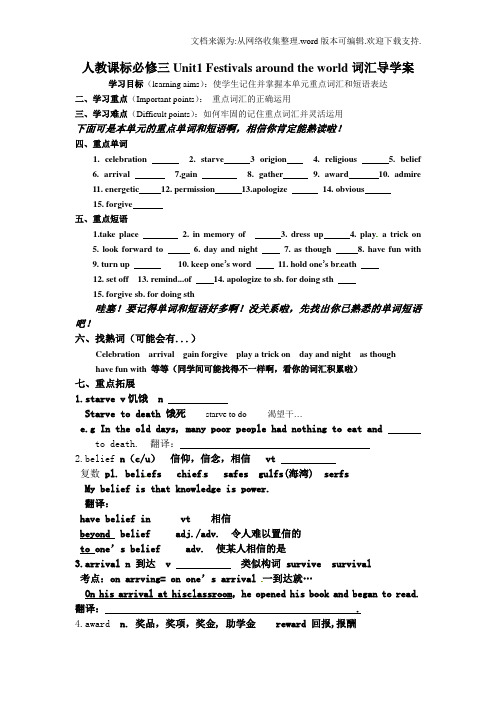
人教课标必修三Unit1 Festivals around the world词汇导学案学习目标(learning aims):使学生记住并掌握本单元重点词汇和短语表达二、学习重点(Important points):重点词汇的正确运用三、学习难点(Difficult points):如何牢固的记住重点词汇并灵活运用下面可是本单元的重点单词和短语啊,相信你肯定能熟读啦!四、重点单词1. celebration2. starve 3 origion 4. religious 5. belief6. arrival7.gain8. gather9. award 10. admire11. energetic 12. permission 13.apologize 14. obvious15. forgive五、重点短语1.take place2. in memory of3. dress up4. play a trick on5. look forward to6. day and night7. as though8. have fun with9. turn up 10. keep one’s word 11. hold one’s br eath12. set off 13. remind...of 14. apologize to sb. for doing sth15. forgive sb. for doing sth哇塞!要记得单词和短语好多啊!没关系啦,先找出你已熟悉的单词短语吧!六、找熟词(可能会有...)Celebration arrival gain forgive play a trick on day and night as thoughhave fun with 等等(同学间可能找得不一样啊,看你的词汇积累啦)七、重点拓展1.starve v饥饿 nStarve to death 饿死starve to do 渴望干…e.g In the old days, many poor people had nothing to eat andto death. 翻译:2.belief n(c/u)信仰,信念,相信 vt复数pl. beli efs chief s safes gulfs(海湾) serfsMy belief is that knowledge is power.翻译:have belief in vt 相信beyond belief adj./adv. 令人难以置信的to one’s belief adv. 使某人相信的是3.arrival n 到达 v 类似构词 survive survival考点:on arrving= on one’s arrival 一到达就…On his arrival at hisclassroom, he opened his book and began to read. 翻译: .4.award n. 奖品,奖项,奖金, 助学金 reward 回报,报酬vt. 裁定;颁发;授予award sb sth= award sth to sbHe was awarded the first prize.翻译:The judge awarded her $200 as damages.翻译:5.admire vt. 钦佩;羡慕;赞美 n adj admire sb. for sth.因某事而羡慕某人我们都钦佩他的勇气。
高中英语必修三导学案:Unit1FestivalsaroundtheworldPeriod3

Book3Unit1Period3改编:李慧学习目标:熟记和使用本节honour;award;admire;lookforwardto;havefunwith拓展所列有关短语自主学习:1.________n.&vt.&vi.收获;收割2.________vi.&vt.(使)饿死;饿得要死3.________n.先人,祖宗4.________vt.获取;获取5.________vt.&vi.&n.收集;vt.授与;判断会合;齐集6.________n.奖;奖品;7.________vt.赞叹;敬佩;敬羡8.________adj.显然的;不言而喻的9.________vt.谅解;宽怒10._________v对不起→____________n.漂亮的,美好的讲堂研究7.honourv.向致敬,n.荣誉,声誉;光荣,有幸;崇拜,敬意Festivalscanalsobeheldtohonourfamouspeople.(P2)也有纪念名人的节日。
规纳拓展:inhonourof为向表示敬爱;为了纪念honouredtodosth.=Itis/wasanhonourfordosth.某人很有幸做小试牛刀:Itistobeinvited.承蒙邀请,十分有幸。
I'mhonouredtomakeaspeechhere.→Itis________________________tomakeaspeechhere.8.awardn.奖;奖品 vt.授与;判断Somepeoplemightwinawardsfortheirfarmproduce ,likethebiggestwatermelonorthemosthandsomerooster.(P2)有些人还可能由于他们的农产品而获奖,比方最大的西瓜或最帅的公鸡。
规纳拓展:win/receiveanaward/awards博得/获取奖赏awardsth.因某事奖赏某人awardsb.sth.==awardsb.授与某人某物Theschool awarded Maryaprize for hergoodwork.学校由于玛丽的优秀表现而奖赏了她。
人教高一英语必修三Unit1Festivalsaroundtheworld导学案
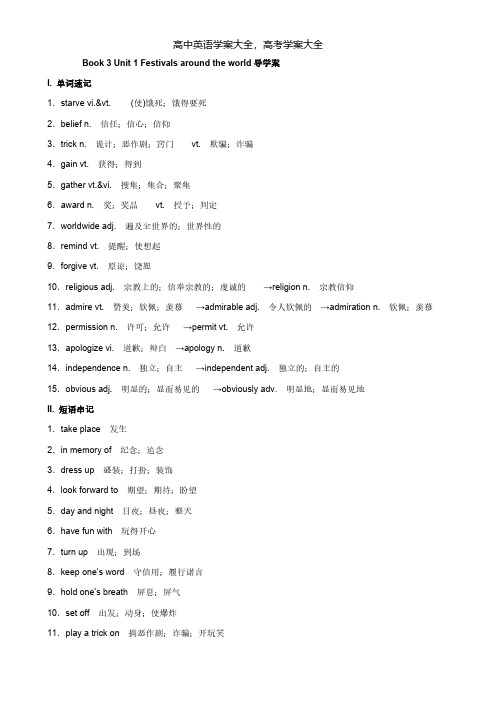
Book 3 Unit 1 Festivals around the world导学案I. 单词速记1.starve vi.&vt. (使)饿死;饿得要死2.belief n. 信任;信心;信仰3.trick n. 诡计;恶作剧;窍门vt. 欺骗;诈骗4.gain vt. 获得;得到5.gather vt.&vi. 搜集;集合;聚集6.award n. 奖;奖品vt. 授予;判定7.worldwide adj. 遍及全世界的;世界性的8.remind vt. 提醒;使想起9.forgive vt. 原谅;饶恕10.religious adj. 宗教上的;信奉宗教的;虔诚的→religion n. 宗教信仰11.admire vt. 赞美;钦佩;羡慕→admirable adj. 令人钦佩的→admiration n. 钦佩;羡慕12.permission n. 许可;允许→permit vt. 允许13.apologize vi. 道歉;辩白→apology n. 道歉14.independence n. 独立;自主→independent adj. 独立的;自主的15.obvious adj. 明显的;显而易见的→obviously adv. 明显地;显而易见地II. 短语串记1.take place 发生2.in memory of 纪念;追念3.dress up 盛装;打扮;装饰4.look forward to 期望;期待;盼望5.day and night 日夜;昼夜;整天6.have fun with 玩得开心7.turn up 出现;到场8.keep one’s word 守信用;履行诺言9.hold one’s breath 屏息;屏气10.set off 出发;动身;使爆炸11.play a trick on 搞恶作剧;诈骗;开玩笑12.remind...of... 使……想起……III. 语境记忆Some festivals take place for agricultural reasons and others are in memory of important events,such as the independence of a country or the arrival of a famous person. Whatever the reasons are,festivals usually mean beautiful clothing and feasts and people look forward to them.IV. 重点句式重温1.be+形容词+to do...At that time people would starve if food was difficult to find,especially during the cold winter months.【仿写】据我所知,这个年轻人很难相处。
高一必修3Unit1Festivalsaroundtheworld-Reading导学案B级
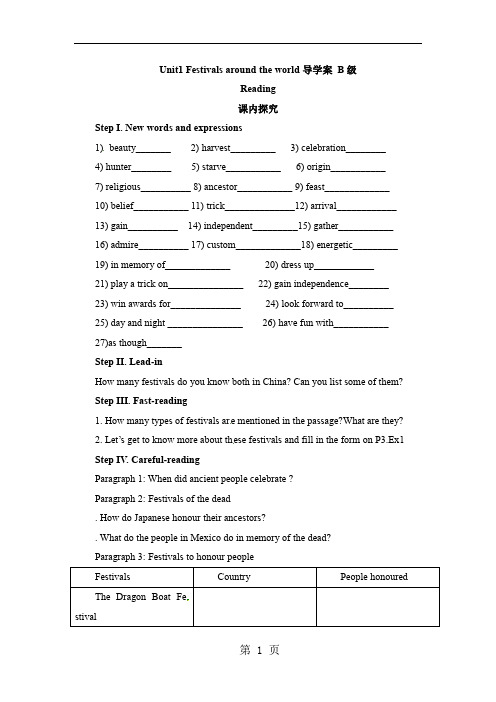
Unit1 Festivals around the world导学案B级Reading课内探究Step I. New words and expressions1) beauty_______ 2) harvest_________ 3) celebration________4) hunter________ 5) starve___________ 6) origin___________7) religious__________ 8) ancestor___________ 9) feast_____________10) belief___________ 11) trick______________12) arrival____________13) gain__________ 14) independent_________15) gather___________16) admire__________ 17) custom_____________18) energetic_________19) in memory of_____________ 20) dress up____________21) play a trick on_______________ 22) gain independence________23) win awards for______________ 24) look forward to__________25) day and night _______________ 26) have fun with___________27)as though_______Step II. Lead-inHow many festivals do you know both in China? Can you list some of them?Step III. Fast-reading1. How many types of festivals are mentioned in the passage?What are they?2. Let’s get to know more about these festivals and fill in the form on P3.Ex1Step IV. Careful-readingParagraph 1: When did ancient people celebrate ?Paragraph 2: Festivals of the dead. How do Japanese honour their ancestors?. What do the people in Mexico do in memory of the dead?Paragraph 3: Festivals to honour peopleThe Dragon Boat FestivalParagraph 4:Harvest FestivalsWhy are autumn festivals happy events?Paragraph 5: Spring FestivalsCo untryParagraph 6: What are the purposes of festivals?Step V. 当堂检测T or F(1). The ancient people needn’t worry about their food.(2). Halloween used to be a festival intended to honor the dead.(3). Qu Yuan was a great poet whom people honor a lot in China.(4). Mid-autumn Festival is held to celebrate the end of autumn.(5). Easter celebrates the birth of Jesus.(6). There is pink snow in spring in Japan.课后拓展Step I. Underline the following important sentences in the text.Festivals are meant to celebrate important times of year.2. At that time people would starve if food was difficult to find, especially during the cold winter months.3. Some festivals are held to honor the dead or to satisfy the ancestors, who might return either to help or to do harm.4. It is now a children’s festival, when they can dress up and go to their neighbours’ homes to ask for sweets.5. China and Japan have mid-autumn festivals, when people admire the moon and in China, enjoy mooncakes.6. The most energetic and important festivals are the ones that look forward to the end of winter and to the coming of spring.7.Some Western countries have v ery exciting carnival, which take place forty days before Easter, usually in February.8. The country, covered with cherry tree flowers, looks as though it is covered w ith pink snow.Step II. 单词拼写:根据句意及汉语提示,写出各句中所缺单词的正确形式。
高中英语Unit1FestivalsAroundtheWorld(I)导学案新人教版必修3
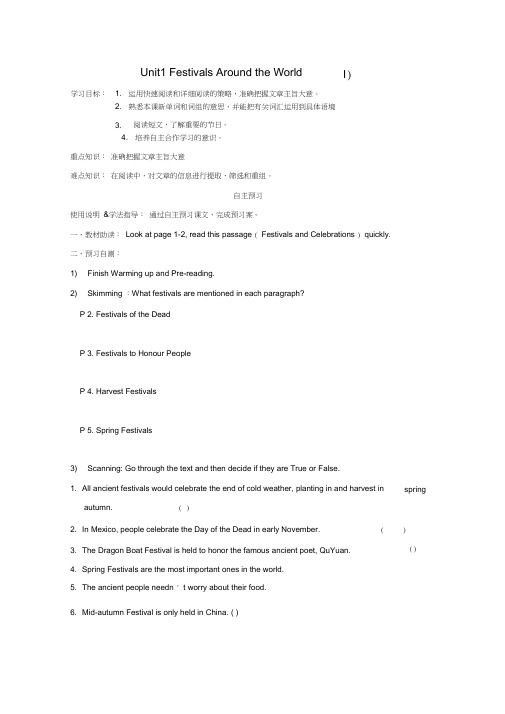
Unit1 Festivals Around the World熟悉本课新单词和词组的意思,并能把有关词汇运用到具体语境4. 培养自主合作学习的意识。
重点知识: 准确把握文章主旨大意难点知识: 在阅读中,对文章的信息进行提取、筛选和重组。
自主预习使用说明 &学法指导: 通过自主预习课文,完成预习案。
一、教材助读: Look at page 1-2, read this passage ( Festivals and Celebrations ) quickly.二、预习自测:1) Finish Warming up and Pre-reading.2) Skimming :What festivals are mentioned in each paragraph?P 2. Festivals of the DeadP 3. Festivals to Honour PeopleP 4. Harvest FestivalsP 5. Spring Festivals3) Scanning: Go through the text and then decide if they are True or False.1. All ancient festivals would celebrate the end of cold weather, planting in and harvest inautumn. ( )2. In Mexico, people celebrate the Day of the Dead in early November. (3. The Dragon Boat Festival is held to honor the famous ancient poet, QuYuan.4. Spring Festivals are the most important ones in the world.5. The ancient people needn ' t worry about their food.6. Mid-autumn Festival is only held in China. ( ) 学习目标: 1. 运用快速阅读和详细阅读的策略,准确把握文章主旨大意。
高中英语人教版必修三第一单元Festivals around the world 单词导学案(学生版)

必修三第一单元Festivals around the world单词导学案一、重点单词1.mean v. (mean-- -- ) adj.mean to do mean doing词汇变形:n. 意义意思-- adj. 有意义的n. 方法手段(单复数同型)练习:1> Do you mean (go) to his party without any gifts?2>Doing nothing means (gain) nothing.3>Every means (have) been tried by now.2.celebrate v. -- n.in celebration of 辨析:celebrate / congratulate / anniversary3.starve v. -- n.饿死渴望做某事渴望某事4.origin n. -- adj. -- adv.起源于5.honor n. v.为了纪念翻译:和你共进晚餐,我深感荣幸。
6.belief n. -- v.相信7.arrival n. -- v.常见的-al为名词后缀:8.independence n. --adj. -- v. 依赖依赖依靠It all depends. 练习:1>(2013全国卷)India (获得独立) in 1947,after a long struggle.2>(2012福建卷)-What are you going to do this weekend?- . If time permits, I may go to Shanghai with my friends.A.Don’t mention it.B. It doesn’t matterC. Forget it.D. It depends.9.award n. v.辨析:award / reward10.admire v. --n. -- adj.因为某事羡慕某人翻译:我们都很钦佩那位音乐家的才华。
【高中】人教版高中英语必修三Unit1Festivalsaroundtheworld阅读导学案

【关键字】高中人教课标必修三Unit1 Festivals around the world阅读导学案编写:王瑞敏审核:黄会省一、学习目标(Learning aims):提高学生的阅读技巧和阅读能力二、学习重点(Important points):对课文中几个长难句的分析理解和掌握三、学习难点(Difficult points):怎样让学生在有限时间内读完并捕捉到有用信息四、扫清阅读障碍,认识文本中出现的黑体词Hunters starve origins religious ancestors in memory of Mexico feast bones beliefs dress up play a trick on poet arrival gain one’s independence from gather agricultural award rooster admire energetic look forward to Easter day and nightClothing Christians as though have fun with customs五、读前(Pre-reading)1.Can you name some Festivals?2. How many paragraphs are there in the passage?3. How many festivals are mentioned in the text?六.Fast(skimming and scanning)What festivals are mentioned in each paragraph?P1. Ancient festivalsCelebrate of the cold weather, planting in spring and in autumn; celebrate when hunters catch animalsP 2. Festivals of the Dead-----Obon------Day of the Dead------HalloweenP 3. Festivals to Honour PeopleDragon Boat FestivalColumbus Day()October 2P 4. Harvest FestivalsHarvest and Thanksgiving FestivalMid-Autumn festivalP 5. Spring festivalsSpring festivalCarnivalEasterCheery Blossom Festival七、Detailed Reading1. Ancient FestivalsMost ancient festivals would celebrate the end of the ____ _______, planting in ______ and harvest in _______. Today’s festivals have many ______, some ________, some seasonal andsomefor special ______ or ______.2.Festivals of the DeadThey have a festival called Obon, when people should go to clean the graves and light incense to honour their ancestors. They light lamps and playmusic.3.What do people in do in memory of the dead?They offer food, flowers and gifts to the dead on the Day of the Dead. People eat certain food on that day.4.Festivals to Honour PeopleThe Dragon Boat Festival Columbus Day National Festival on October 25. Spring FestivalsWhat do people usually do at spring festivals?At spring festivals, people usually have dances, carnivals and other activities to celebrate the end of winter and the coming of spring.6.What does Easter celebrate?Keys: It celebrates the return of Jesus from the dead and the coming of spring and new life.Do you know the symbols of Easter?Keys: Easter eggs and Easter Bunnies.7.Do you know the date of Japan’s Cherry Blossom Festival?March 15- April 151. Festivals are meant to celebrate important times of year.Mean的用法I never meant him to work for us.mean to do意欲做mean doing意味着做2. honor1) 光荣,荣誉(n)They fight for the honor of the country.On e must show honor to one’s parents.2) in honor of 为了纪念A festival is set in honor of the hero.3) an honor 光荣的人或事情Liu Xiang is an honor to our country.4) 尊敬,给以荣誉(v)Children should honor their parents.3. satisfy Vt. Vi. 使满意,使满足Nothing can satisfy him except the best.Some people ar e really hard to satisfy.sb. be satisfied with 对…满意e.g. She’s not satisfied with her new house4. At that time people would starve if food was difficult to find, especially during the cold winter months.那时,特别是在冬季寒冷的日子里,如果难以找到食物,人们就会挨饿。
高中英语导学案 必修3 Unit 1 Festivals around the worldGrammar

Unit 1 Grammar【学习目标】:非限制性定语从句【学习重点】:非限制性定语从句和限制性定语从句区分【学习难点】:as和which的区分【教学过程】:定语从句有限制性和非限制性两种。
限制性定语从句是先行词不可缺少的部分,去掉它主句意思往往不明确;非限制性定语从句是先行词的附加说明,去掉了也不会影响主句的意思,它与主句之间通常用逗号分开,例如:This is the house which we bought last month. 这是我们上个月买的那幢房子。
(限制性)The house, which we bought last month, is very nice.这幢房子很漂亮,是我们上个月买的。
(非限制性)一、that不能用来引导非限制性定语从句。
如:【考例一】She heard the terrible noise, ________brought her heart into her mouth.A. itB. whichC. thisD. that【解析】选B。
后半句为非限制性定语从句,尽管先行词noise属于事物,也不能用that而要用which来引导。
which指代noise,在从句中作主语。
二、除which外,还可用when,where,whose,whom等引导非限制性定语从句,且各自的用法及差异与它们用在限制性定语从句时相同。
如:She is going to live in Macao, w here she has some close friends. 她要到澳门去居住,在那里她有几个密友。
(关系副词where指代表示地点的名词Macao,并在从句中作状语。
) 【考例二】Recently I bought an ancient Chinese vase, ________was very reasonable.A. which priceB. the price of whichC. its priceD. the price of whose【解析】选B。
高中英语人教版必修3单元导学案 Unit 1 Festivals around the world
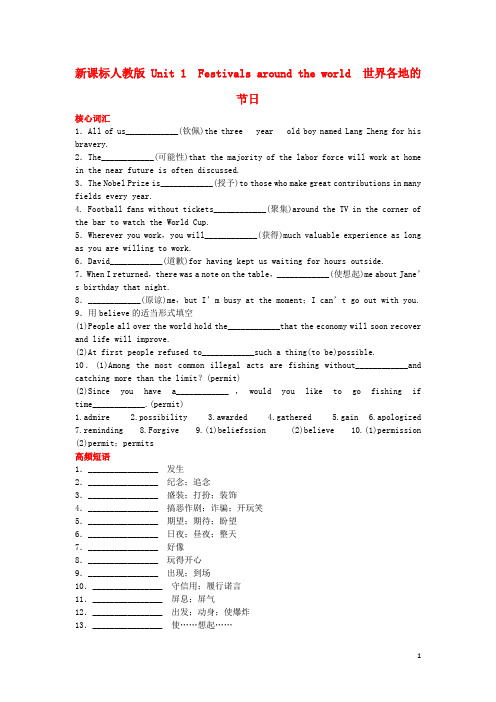
新课标人教版 Unit 1 Festivals around the world 世界各地的节日核心词汇1.All of us____________(钦佩)the three year old boy named Lang Zheng for his bravery.2.The____________(可能性)that the majority of the labor force will work at home in the near future is often discussed.3.The Nobel Prize is____________(授予)to those who make great contributions in many fields every year.4. Football fans without tickets____________(聚集)around the TV in the corner of the bar to watch the World Cup.5.Wherever you work,you will____________(获得)much valuable experience as long as you are willing to work.6.David____________(道歉)for having kept us waiting for hours outside. 7.When I returned,there was a note on the table,____________(使想起)me about Jane’s birthday that night.8.____________(原谅)me,but I’m busy at the moment;I can’t go out with you. 9.用believe的适当形式填空(1)People all over the world hold the____________that the economy will soon recover and life will improve.(2)At first people refused to____________such a thing(to be)possible.10.(1)Among the most common illegal acts are fishing without____________and catching more than the limit?(permit)(2)Since you have a____________,would you like to go fishing if time____________.(permit)1.admire2.possibility3.awarded4.gathered5.gain6.apologized7.reminding8.Forgive9.(1)beliefssion (2)believe10.(1)permission (2)permit;permits高频短语1.________________ 发生2.________________ 纪念;追念3.________________ 盛装;打扮;装饰4.________________ 搞恶作剧;诈骗;开玩笑5.________________ 期望;期待;盼望6.________________ 日夜;昼夜;整天7.________________ 好像8.________________ 玩得开心9.________________ 出现;到场10.________________ 守信用;履行诺言11.________________ 屏息;屏气12.________________ 出发;动身;使爆炸13.________________ 使……想起……1.take place 2.in memory of 3.dress up 4.play a trick on 5.look forward to 6.day and night 7.as though 8.have fun with 9.turn up 10.keep one’s word 11.hold one’s breath 12.set off 13.remind...of...重点句式1.At that time people would starve if food____________,especially during the cold winter months.在当时,如果食物难以找到,人们就会挨饿,特别是在寒冷的冬季。
人教课标必修三Unit1_Festivals_around_the_world语法导学案
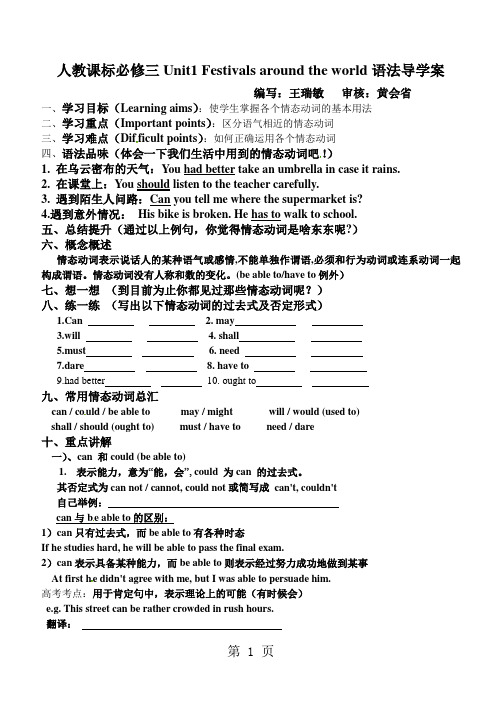
人教课标必修三Unit1 Festivals around the world语法导学案编写:王瑞敏审核:黄会省一、学习目标(Learning aims):使学生掌握各个情态动词的基本用法二、学习重点(Important points):区分语气相近的情态动词三、学习难点(Dif ficult points):如何正确运用各个情态动词四、语法品味(体会一下我们生活中用到的情态动词吧!)1. 在乌云密布的天气:You had better take an umbrella in case it rains.2. 在课堂上:You should listen to the teacher carefully.3. 遇到陌生人问路:Can you tell me where the supermarket is?4.遇到意外情况:His bike is broken. He has to walk to school.五、总结提升(通过以上例句,你觉得情态动词是啥东东呢?)六、概念概述情态动词表示说话人的某种语气或感情,不能单独作谓语,必须和行为动词或连系动词一起构成谓语。
情态动词没有人称和数的变化。
(be able to/have to例外)七、想一想(到目前为止你都见过那些情态动词呢?)八、练一练(写出以下情态动词的过去式及否定形式)1.Can2. may3.will4. shall5.must6. need7.dare 8. have to9.had better 10. ought to九、常用情态动词总汇can / co uld / be able to may / might will / would (used to)shall / should (ought to) must / have to need / dare十、重点讲解一)、can 和could (be able to)1.表示能力,意为“能,会”, could 为can 的过去式。
高中英语必修三导学案:Unit1FestivalsaroundtheworldPeriod4全面版

语法:神态动词Book3 Unit1Period4改编:李慧学习目标:1熟记和使用本节体现的神态动词的各样用法2 拓展其有关用法:神态动词+have done/ 神态动词表推断的程度大小 will/would对照3.熟记神态动词的各样规律及用法自主学习研究1.can和could的用法(1) 表示能力。
She can speak English though she is six.(2) 表示猜想,主要用于疑问句或否认句。
(could 比 can 可能性更小 )— Can he be in the reading room now? 他可能在阅览室吗?— No, he can't be in it.Because I saw him in the office just now.不,他不行能在 (阅览室 )。
由于我刚才在办公室看见他了。
(3)表示允许或恳求允许。
(could 比 can 语气更委宛 )Could you do me a favour? 请你帮我个忙好吗?以上句子中的could 不表示过去,could 和 can 没有时间上的差异。
【提示】can 一般指自己拥有的能力,而 be able to 表示经过一段时间的努力后所拥有的能力,相当于 manage to do 或 succeed in doing。
Without his hard work ,he was not able to get good grades.假如没有他的努力,他是不可以取Babies can swim when they were born.得好成绩的。
婴儿们刚生下来时会游泳。
(经过努力(自己拥有))2. may 和might 的用法(1)表示允许或恳求允许。
(用 might 比用 may 更礼貌,语气更委宛)— May I come in? — Yes, you may./Of course , you may.No , you may not/you can't/you mustn't/you had better not.He asked if he might borrow my pen.(2)表示可能性。
高中英语Unit1Festivalsaroundtheworld语言点导学案新人教版必修3

Unitl Festivals Around the World 学习目标:掌握本部分重点单词和短语的用法;提高阅读理解的能力。
学习重点:本单元重点单词和短语的用法。
学习难点:学会正确使用重点单词短语。
学习过程:【自主学习】1. starve 挨饿,饿死;感觉很饿,仅用于进行时态。
starve to death ;be starved o f= starve for = long for 渴望; 缺乏Millions of people starved to death during the wa The homeless childre n were starved for love.When will dinner be ready? I ' m starving. 晚饭什么时候做好?我快饿死了。
2. do harm to sb = harm sb 伤害某人3. in memory of; in honor of have a good / poor memory The museum was built in memory of the famous scie ntist.4. dress up 盛装、打扮dress sb "给,穿衣服”;自己穿衣服用 dress on eselfWake up children and dress them. 唤醒孩子,给他们穿上衣服。
dre ss up 是“穿上最好的衣服”,常指"打扮,化装”,如:You should dress up whe n you take part in the party. _______ . _____________________5. play a trick on 诈骗某人;开某人玩笑These childre n loved playi ng tricks on their teachers. .6. award n. 奖品,奖项,奖金,助学金v.判给,授予award sb. sth. 奖赏某人某物 辨析:award 禾口 reward :award 后接双宾语 award sb. a metal 授予某人奖章reward 奖赏,给,报酬,不能接双宾语;reward sb. for sth. 因,奖赏某人;reward sb. with sth. 用某物酬劳某人She rewarded herself with a cup of coffee after a whole morning ' s hard work. 一上午的刻苦学习后,她冲一杯咖啡来奖赏自己。
人教版高中英语必修三Unit1Festivalsaroundtheworldword导学案4
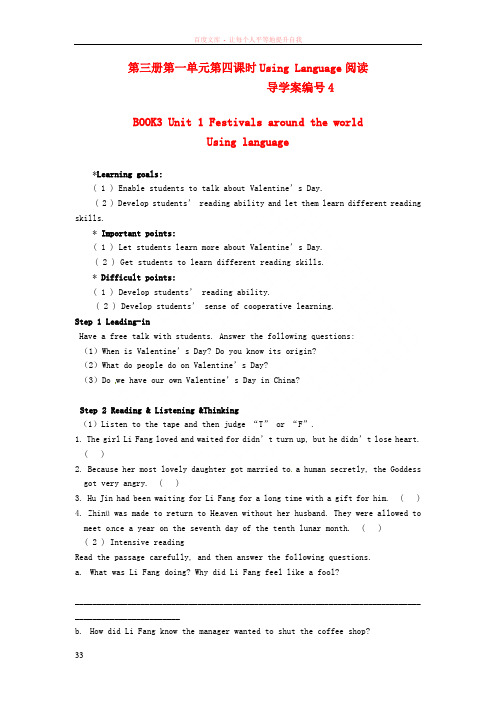
第三册第一单元第四课时Using Language阅读导学案编号4BOOK3 Unit 1 Festivals around the worldUsing language*Learning goals:( 1 ) Enable students to talk about Valentine’s Day.( 2 ) Develop students’ reading ability and let them learn different reading skills.* Important points:( 1 ) Let students learn more about Valentine’s Day.( 2 ) Get students to learn different reading skills.* Difficult points:( 1 ) Develop students’ reading ability.( 2 ) Develop students’ sense of cooperative learning.Step 1 Leading-inHave a free talk with students. Answer the following questions:(1)When is Valentine’s Day? Do you know its origin?(2)What do people do on Valentine’s Day?(3)Do we have our own Valentine’s Day in China?Step 2 Reading & Listening &Thinking(1)Listen to the tape and then judge “T”or “F”.1. The girl Li Fang loved and waited for didn’t turn up, b ut he didn’t lose heart. ( )2. Because her most lovely daughter got married to a human secretly, the Goddess got very angry. ( )3. Hu Jin had been waiting for Li Fang for a long time with a gift for him. ( )4. Zhinü was made to return to He aven without her husband. They were allowed to meet o nce a year on the seventh day of the tenth lunar month. ( )( 2 ) Intensive readingRead the passage carefully, and then answer the following questions.a.What was Li Fang doing? Why did Li Fang feel like a fool?_______________________________________________________________________________ ________________________b.How did Li Fang know the manager wanted to shut the coffee shop?_______________________________________________________________________________ ___________________________c. Why was the TV story what Li Fang needed?______________________________________________________________________________ ___________________________d.Why did Li Fang throw away flowers and chocolates for Hu Jin?_______________________________________________________________________________ __________________________e. What is the reason why Li Fang did not meet Hu Jin on time?______________________________________________________________________________ __________________________Step 3 TestingAfter you get some information from the passage, fill in the following blanks.Story 1Introdu ction Zhinv, the w 1 girl, the most l 2 of t he daughters, visited the earth and met Niulang, t he h 3 boy.Develop ment They f 4 , married secretly and were very happy.Climax (高潮)The Goddess of Heaven got so angry that she forced Zhinv back to H 5 . Niulang tried to f 6 her but was stopped by the Milky Way. Thus, the c 7 were separated.Ending The Goddess of Heaven allowed the couple to meet oncea year on the s 8 day of the s 9 l 10 monthwhen magpies made ab 11__ of their wings.Story 2Intro ducti on Li Fang was waiting alone at the c 1 shop with his roses and chocolates, but Hu Jin didn’t 2 . He thought she would keep her w 3 . Feeling like a f 4 , he would d 5 his sadness in coffee.Devel opmen t Li Fang watched a TV program about “Qiqiaojie”. Thinking Hu Jin played a t 6 on him, he t 7 away the gifts and s 8 off for home.Clima x (高潮) / Endin g As Li Fang passed the 9 shop on the corner, he heard Hu Jin ca lling and waving at him, “I’ve been waiting long. I have ag 10 for you! Why are you so late?” What would he do? Would she f 11 him?。
- 1、下载文档前请自行甄别文档内容的完整性,平台不提供额外的编辑、内容补充、找答案等附加服务。
- 2、"仅部分预览"的文档,不可在线预览部分如存在完整性等问题,可反馈申请退款(可完整预览的文档不适用该条件!)。
- 3、如文档侵犯您的权益,请联系客服反馈,我们会尽快为您处理(人工客服工作时间:9:00-18:30)。
Learning Plan (III) for Grammar
学习目标:掌握情态动词may/might; will/would; can/could ;shall/should;
must/can’t的用法
重点知识:情态动词的用法
难点知识:以上5组情态动词的区别与联系
自主预习
一、自主学习
1. must 的主要用法。
⑴表示必须、必要
We must do everything step by step .
⑵表一定(只用在肯定句中) He must be an honest boy.
must +have +过去分词的结构,常用在肯定句中,表示对过去发生行为的推测,含有“一定”、“准是”的意思。
否定和疑问句用can。
She must have studied English before.
⑶ must 的否定式有两个:当回答由must引起的问题时,否定答复要用needn’t或don’t have to表示“不必”、“无须”、“用不着”、“不一定”的意义。
mustn’t表示“不应该”、“不许可”、“禁止”
Must I go tomorrow? 明天我必须去吗?
Yes, please.是的,请吧! No , you needn’t. 不,你不必去。
(4) have to和must 的区别
①含义和用法上的区别,have to强调客观需要做某事,即表示由于客观外界的条件的需要不得不做某事,含有“形势逼迫”的意味,must强调说话者主观上认为必须做某事,含有“主观判断”的意味。
My bike was broken on my way to school. I had to walk there.
我的自行车在上学的路上坏了,我不得不走路去上学。
We must learn English well. 我们必须学好英语。
②否定式的区别:have to 的否定式意思为“不必”,must的否定式mustn't 意为“禁止,不允许”。
因此,以must 开头的一般疑问句的肯定回答为“Yes, 主语+must.”。
否定回答为“No, 主语+needn't / don't have to.”.
Must I finish the homework now? 我必须现在完成作业吗?
Yes, you must. /No, you needn't. 是的,你必须现在完成。
(不,你不必。
)
3. ought to 的用法
⑴表示义务,意为“应该”(因责任、义务而该做),口气比should稍重。
We ought to defend our country.我们应当保卫我们的国家。
You ought to respect your parents.你应当尊敬你的父母。
⑵表示推测,暗含很大的可能,可译为“应该是,会是”。
Prices ought to come down soon.价格可能会很快下跌。
⑶ ought to和should的含义较近,但不完全相同。
ought to表示“应该”,是从“义务”或“按理推断”的角度来讲的。
should则是从说话人的个人看法这一角度来讲的。
You are her mother. You ought to look after her.
你是她的母亲,你应当照管她。
(是道义上的责任,不能和should互换。
)
We should encourage him, for we are his classmates.
我们应该鼓励他,我们是他的同班同学啊!
二、Find the sentences in the text that use modal verbs and underline them.
三、我的疑惑?
合作探究案
I.合作探究:
一、Explain the meanings of the modal verbs in the following sentences and choose the best answer.
A.Intention
B. Duty
C. Promise
D. Possibility
E. Guessing
1. By lunchtime they would all be sold. ( )
2. His restaurant ought to be full of people. ( )
3. What could have happened? ( )
4. Nothing could have been better? ( )
5. Something terrible must have happened. ( )
6. I will take all that fat off you in two weeks( ).
7. He could not believe his eyes. ( )
8. He wondered if he should go to the library to find out. ( )
9. He couldn’t have Yong Hui getting away with telling people lies. ( )
10. He had better do some research. ( )
二、能力提升
1. What do you mean, there are only ten tickets? There be twelve
A. should
B. would
C. will
D. shall
2. It_____ have been Tom that parked the car here, as he is the only one with a car.
A. may
B. can
C. must
D. should
3. One of the few things you ____ say about English people with certainty is that they talk a lot about the weather. A. need B. must C. should D. can
4. —I don’t care what people think.
—Well, you . A. could B. would C. should D. might
5. I can’t leave. She told me that I stay here until she comes back.
A. can
B. must
C. will
D. may
6. —It’s the office! So you know eating is not allowed here.
— Oh, sorry. A. must B. will C. may D. need
7. He did not regret saying what he did but felt that he it differently.
A. could express
B. would express
C. could have expressed
D. must have expressed
8. —Hi, Tom . Any idea where Jane is?
— She _____in the classroom . I saw her there just now.
A. shall be
B. should have been
C. must be
D. might have been
9. Some people who don’t like to talk much are not necessarily shy;they
_____just be quiet people. A. must B. may C. should D. would
10. The traffic is heavy these day,I _______ arrive a bit late, so could you save me a place?
A can
B must
C need
D might
三、自我反思。
